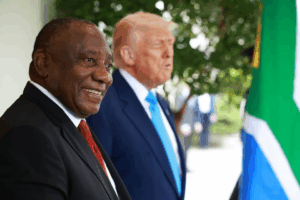Whether you are an aggrieved member of a family bombed to oblivion in Yemen, Afghanistan, Somalia or Libya, or held under military siege in Kashmir, do not expect any justice from the UNSC, writes Iqbal Jassat.
The annual gathering of global leaders at the United Nations has yet again lit up New York’s elite hotels and busy thoroughfares.
Though the 74th session of the UN General Assembly is underway in the midst of unresolved challenges facing the world regarding climate change, inequality, racism, colonization, military occupation and war, not much change is expected.
In fact many skeptics, including myself, are questioning whether the huge expenses incurred by countries, especially those such as South Africa, battling debts, facing economic crisis and riddled with corruption, justifies their participation.
Perhaps the more important question would be whether the voices of countries apart from the “Big Five” who in effect rule the roost via the veto powers they possess, matter?
Of course not! Not only do they not matter, they are regularly ignored, silenced and contemptuously marginalized.
It is simply because the “Big Five” are states which were allies in the Second World War, have unfairly been granted permanent status as veto powers. China, France, Russia, the United Kingdom and the United States, all nuclear weapons states, thus possess the means to prevent the adoption of any resolution which they disapprove. Whether draft resolutions have moral weight or overwhelming international support, either one of the five states can block them.
That South Africa is due to take up the presidency of the UN Security Council, is no cause for celebration. Its position as a non-permanent member is no more than routine “merry-go-round”; which apart from the thumping of the gavel, remains utterly powerless.
Besides being undemocratic, the veto power is undoubtedly the UN Charter’s most outlandish piece of discrimination between permanent and non-permanent members.
The abuse of power inherent in this imbalance is a perpetual problem. And will remain so unless the status quo is reversed resulting in the leveling of the playing fields.
The tragedy is that none of the humanitarian disasters caused by wars, military occupations, ethnic cleansing and a host of human rights atrocities, will ever be accorded any redress in the current disjointed setting.
Consider the case of Palestine. According to the Security Council’s own report released a few days ago, since 1970, the US has used the veto far more than any other permanent member, most frequently to “block decisions that it regards as detrimental to the interests of Israel”.
Though international jurists, most notably Richard Falk and John Dugard have consistently argued that Israel’s colonial activities in Occupied Palestine constitute violation of international law, US vetoes have ensured that illegal violations continue with impunity.
Again it matters not whether South Africa is “honoured” to be in the driving seat, the steering wheel of the UNSC is in the hands of the veto powers.
Whether you are an aggrieved member of a family bombed to oblivion in Yemen, Afghanistan, Somalia or Libya, or held under military siege in Kashmir, do not expect any justice from the UNSC.
The same applies whether you or your near and dear ones in Myanmar were subjected to ordeals of rape and torture as your village was razed to the ground by Burmese forces.
And in East Turkestan, as a member of the Uighur population, if you failed to flee Chinese persecution, you find yourself held against your will in mass concentration camps.
Not only has the United Nations failed to intervene in any of these tragic events; it has facilitated injustices by permitting unequal and undemocratic conduct by the “Big Five” against the rest of the world.
Iqbal Jassat is an Exec Member: Media Review Network. Johannesburg.


